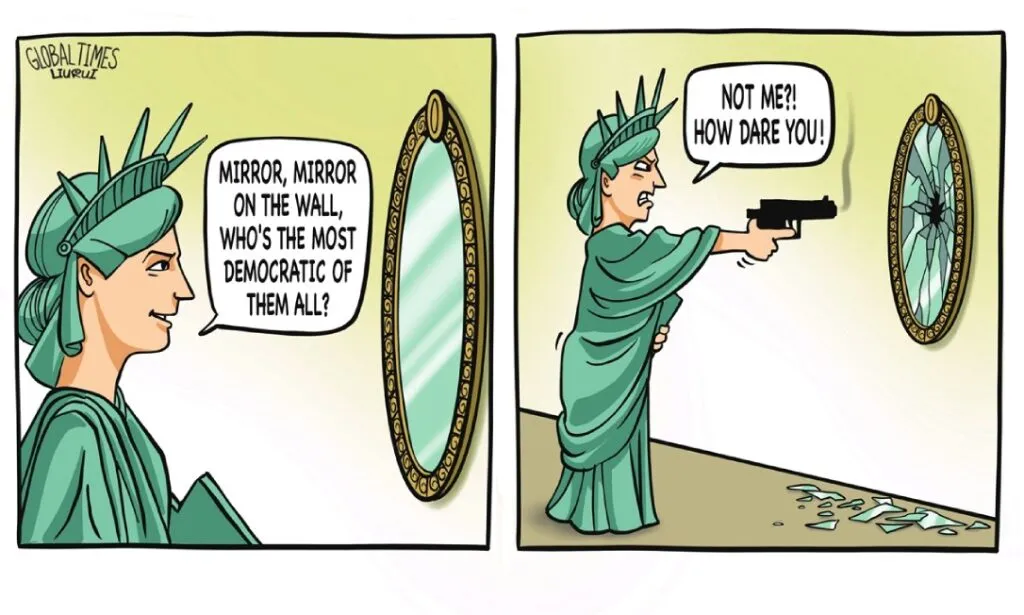Report: Beijing unleashed a massive propaganda campaign to redefine democracy
China has unleashed a massive propaganda campaign aimed at recreating democracy in its own image, according to a new report published Tuesday.
The effort included flooding social media outlets with thousands of posts, cartoons and memes, all of which questioned age-old assumptions about democracy, according to "China's Narrative War on Democracy," from Recorded Future, a cyber security firm. (The Record Media is an editorially independent arm of Recorded Future.)
Among the campaign's most popular offerings, it said: a drawing of the Statue of Liberty looking into the mirror asking “who is the most democratic of them all?” The next frame shows her shooting the mirror, suggesting that Lady Liberty didn't like the answer.
“What makes these cartoons dangerous is they aren’t all lies or exaggerations,” said Charity Wright, a threat intelligence analyst and author of the report. “Some of these weaknesses they point to are things the US is legitimately struggling with.”
According to her research, the campaign began in earnest about a week before the Summit for Democracy hosted by President Joe Biden. The US pointedly didn't invite China but included Taiwan on the guest list. China considers Taiwan a renegade province. The move clearly rankled leaders in the Beijing. Days after seeing the guest list, Beijing offered its own democratic message.
Wright said her research found that the democracy narratives started at the top, with spokespeople from China's Ministry of Foreign Affairs starting the discussion and then state-sponsored social media outlets picking up the narrative from there. "This was the opposite of grassroots," Wright said. "Bot-like accounts amplified the official line" in hopes of finding an audience among people who are either disillusioned by their own democracies or by America itself.

“Recently, democracy is being widely discussed around the world,” Vice Foreign Minister Le Yucheng said during his introductory remarks at a live virtual panel discussion on democracy hosted on YouTube. “This should have been a good thing. But a very few countries are using democracy as a cover… They even take democracy as a political tour for selfish gains and build small blocks to create division and confrontation in the world. This obviously runs against the spirit of democracy.”
Back in the 1980s, Deng Xiaoping famously tried to redefine capitalism by calling China’s economic reform program “capitalism with Chinese characteristics.” Beijing’s new political equivalent has a less catchy name: they call it “whole-process people’s democracy.”
“There is no fixed model of democracy; it manifests itself in many forms,” China’s top government body, the State Council, argued in a white paper entitled “China: Democracy That Works” released before the Biden democracy summit.
China’s democracy, it said, has lifted 800 million Chinese out of extreme poverty; has built the world’s largest social security and healthcare system, and has created millions of jobs every year for the past 15 years. The list had the feel of an American re-election campaign.
“China is exceptional at narrative warfare right now,” said Wright. “They understand how to craft messaging to a localized audience and appeal to their target audience through elements of shared identity, language, and culture. What they are trying to do is position audiences against the US and the West, and put Beijing in a more favorable light.”
While the Recorded Future report didn’t track the effectiveness of the tactics, it did provide for the first time an idea of its breadth. There were nearly 8,500 mentions of “what is #democracy” in the two weeks between December 1 and December 16, the analysts found, which coincides with the days before, during, and after the Summit for Democracy.
“Their strategy was simple: consistent messaging, lots of posts and continuous chatter across a whole variety of online platforms,” Wright said, adding that China has focused on amplifying the message in countries that are taking part in Beijing’s Belt and Road Initiative, China’s big-money push to build ports, rail lines, and telecommunications networks around the world.
Before the latest campaign, Beijing’s media accounts referred to the word “democracy” a handful of times each day, the report said. As the opening of the Summit for Democracy neared, however, the mentions of democracy ballooned from 40 just before the summit to 166 mentions in a single day from the same accounts, it said. Mentions stayed at that level for almost a week with hashtags like “what kind of #democracy is this?” and “who defines #democracy.”
The campaign is reminiscent of the Cold War when the United States and the Soviet Union went toe-to-toe over the relative merits of their political systems.
Dina Temple-Raston
is the Host and Managing Editor of the Click Here podcast as well as a senior correspondent at Recorded Future News. She previously served on NPR’s Investigations team focusing on breaking news stories and national security, technology, and social justice and hosted and created the award-winning Audible Podcast “What Were You Thinking.”



